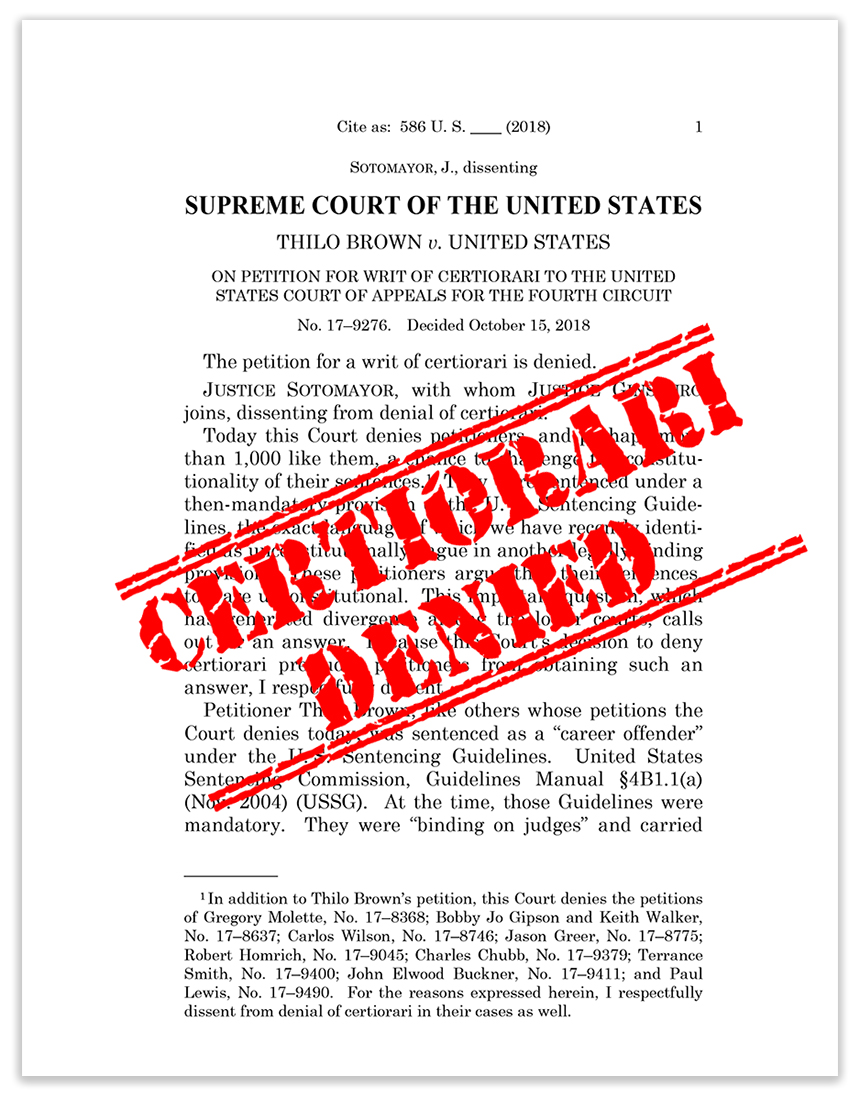We post news and comment on federal criminal justice issues, focused primarily on trial and post-conviction matters, legislative initiatives, and sentencing issues.

SUPREME COURT REFUSES CHANCE TO APPLY JOHNSON TO MANDATORY GUIDELINES
Three years ago, the Supreme Court held in Johnson v. United States that the “residual clause” of the Armed Career Criminal Act definition of a crime of violence, which included within its sweep any crime that “otherwise involves conduct that presents a serious potential risk of physical injury to another,” was unconstitutionally vague. Because the ACCA’s definition was identical to the Guidelines’ “career offender” definition, a lot of people thought that it was only a matter of time before “career offender” sentences would be cut as well.
 But two years after Johnson, the Supreme Court ruled in Beckles v. United States that because the Guidelines are merely advisory, a constitutional vagueness challenge to the career offender guidelines would not work. But the Guidelines have only been advisory since 2005, when United States v. Booker held that mandatory sentencing guidelines were unconstitutional. What the Beckles court did not answer was the question of whether someone whose “career offender” sentence was imposed under the pre-2005 mandatory Guidelines could successfully make a Johnson challenge. Nevertheless, Beckles seemed to presage a holding that would invalidate mandatory Guideline “career offender” sentences under Johnson as soon as the proper case presented itself to the Supremes.
But two years after Johnson, the Supreme Court ruled in Beckles v. United States that because the Guidelines are merely advisory, a constitutional vagueness challenge to the career offender guidelines would not work. But the Guidelines have only been advisory since 2005, when United States v. Booker held that mandatory sentencing guidelines were unconstitutional. What the Beckles court did not answer was the question of whether someone whose “career offender” sentence was imposed under the pre-2005 mandatory Guidelines could successfully make a Johnson challenge. Nevertheless, Beckles seemed to presage a holding that would invalidate mandatory Guideline “career offender” sentences under Johnson as soon as the proper case presented itself to the Supremes.
Thilo Brown, as well as two other mandatory Guidelines “career offenders,” had such cases, and their petitions for writs of certiorari arrived at the high court last summer while the Justices were gone fishin’. The three cases would provide the Court a chance to answer the Johnson mandatory “career offender” question everyone thought the Justices had all but begged to have presented.
Apparently not. Last week, the Court denied certiorari to all three.
The decision not to review Thilo’s case drew a dissent from Justice Sonia Sotomayor, rare for a cert denial. She said, “This important question, which has generated divergence among the lower courts, calls out for an answer… Regardless of where one stands on the merits of how far Johnson extends, this case presents an important question of federal law that has divided the courts of appeals and in theory could determine the liberty of over 1,000 people. That sounds like the kind of case we ought to hear.”
Brown v. United States, Case 17-9276 (Supreme Court, Oct. 15, 2018)
– Thomas L. Root

